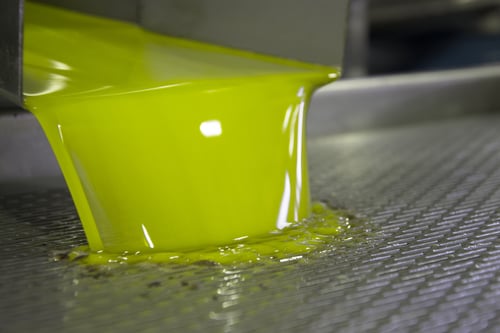What kind of olive oil should you buy? Cold-pressed, first pressed or unfiltered? Here is a list of terms you may see on a bottle of olive oil to help you choose.
A glossary of olive oil terminology
Virgin - The use of the term "virgin" generally describe an olive oil that was mechanically extracted without the use of chemicals. But the term can also refer to a grade of olive oil called “virgin” if it meets the quality standards established for that grade. If an olive oil is NOT described as "virgin," it is an indication that at least some of the olive oil in the product has been refined in a process similar to the process used for producing vegetable oil. Olive oil that has been refined by definition contains oil that is not as flavorful as virgin olive oils...but has the same desirable fatty acid composition (i.e. predominantly monounsaturated fat) as virgin oils.
Refined – Refined olive oil is olive oil that has been subjected to a refining process to eliminate flavor and color to produce a neutral tasting oil that is desired in some culinary applications. The refining process, which is identical to the refining that other neutral tasting oils undergo, involves heat and chemical purification.
Olive Oil - The term “olive oil” generally means oil that has been extracted from the olive fruit mechanically and without the use of chemical solvents. (It is important to note that the term “olive oil” on a product means that it has not been extracted with solvents—this is true for all grades of olive oil.) But the term “olive oil” can also refer to a grade of olive oil called “olive oil”—confusing, right?--or sometimes called “regular,” “classic,” or “light-tasting olive oil.” When used as the grade, “olive oil” refers to a mixture of refined olive oil and virgin olive oil (which gives the oil a light flavor and color, except in the case of a product noted as “light-tasting” olive oil, which has very little virgin olive oil added and thus is a neutral tasting oil).
Extra Virgin - As in life, when it comes to olive oils, being a virgin is a yes or no proposition. When a virgin olive oil is described as being "extra," it does not mean it is "more" virgin; rather, the term indicates that the oil is a superior or premium virgin oil, meeting higher quality standards than those that apply for the ordinary "virgin" grade of olive oil.
Cold-pressed and First Cold-Press - The use of the terms "cold pressed" or "first cold-press" on an extra virgin olive oil label is intended to indicate that the oil was extracted by mechanical means at temperatures below 27ºC (80.6ºF). The use of these terms is redundant; under the international standards now in effect around the world, in order for an olive oil to be labeled as "virgin" (including "extra virgin") it must be extracted by mechanical means at temperatures that will not alter the oil (and of course, without any chemicals). To the extent these terms refers to a "press," the term is mostly figurative--nearly all olive oil is extracted using other mechanical means (malaxers and centrifuges) instead of presses. So in today's world the terms "cold-pressed" and "first cold-press" have little actual significance on a label of extra virgin olive oil. Learn more about how olive oil is extracted.
Mono-varietal - Most olive oil is made from a blend of different kinds of olives. Mono-varietal means that the bottle is made from olives of one type.
Estate bottled - This means that the oil was harvested and pressed at the same farm where the olives were grown.
Early harvest - Early harvest olive oil means that the olives were picked before they were fully ripened. Early harvest olive oil has a more peppery and bitter taste. Sometimes a harvest is done early as a matter of choice. But in some regions (e.g. in Tuscany), where there is a risk of early frost that could damage the trees, an early harvest may be considered a necessity.
Olio nuovo - This means "new oil". It refers to olive oil that has been recently harvested and extracted. It is a seasonal product that is only available in the fall/winter (if harvested in the Northern Hemisphere) and typically is extremely fresh, robust and flavorful.
Unfiltered - The majority of olive oil is filtered to remove olive solids. Unfiltered olive oil uses gravity to separate the solids from the oil. Some sediment may remain. Read more about unfiltered oil.
Organic - Like other forms of organic produce, organic olive oil means that the olives were grown without the use of chemical pesticides or chemical fertilizers. An accredited organization needs to certify the olives as organic.
Robust/Delicate - This is a description of flavor. Robust means full-bodied flavor that pairs well with other strong flavors like tomatoes or meat. Delicate or mild olive oil go well with fish or vegetables.
Extra-light tasting - Extra-light tasting olive oil has the same number of calories as all olive oils. The term refers to the taste which is neutral.
DOP - Denominazione d' Origine Protetta (roughly, "protected designation of origin") means that the oil was produced from olives grown and processed in a given area. There are also seals that indicate "Protected Designation of Origin" or "Protected Geographical Indication" offered by the European Union.







 The North American Olive Oil Association is committed to supplying North American consumers with quality products in a fair and competitive environment; to fostering a clear understanding of the different grades of olive oil; and to expounding the benefits of olive oil in nutrition, health, and the culinary arts. | © North American Olive Oil Association. All Rights Reserved.
The North American Olive Oil Association is committed to supplying North American consumers with quality products in a fair and competitive environment; to fostering a clear understanding of the different grades of olive oil; and to expounding the benefits of olive oil in nutrition, health, and the culinary arts. | © North American Olive Oil Association. All Rights Reserved.